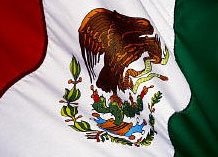Ruben Navarrette: Putting The Blame Where It Belongs
This month's column by Ruben Navarrete for Hispanic Trends.
 In many countries in Latin America, the perpetual tension is political. Life is a series of closed suitcases, each offering a different mixture of freedoms and governance: Democracy? Oligarchy? Republic? Once or twice per century, you may get the chance to swap one for another. Deal, or no deal?
In many countries in Latin America, the perpetual tension is political. Life is a series of closed suitcases, each offering a different mixture of freedoms and governance: Democracy? Oligarchy? Republic? Once or twice per century, you may get the chance to swap one for another. Deal, or no deal?Not in Mexico. There, the tension is economic. It’s about dollars and cents. Life isn’t about competing ideologies as much as opportunities, lost and found.
It used to be that the economic story of Mexico could be told in broad strokes. There was no middle class. You were either rich, or you were poor. And the poor vastly outnumbered the rich. Many of the poor had no choice but to look for work in the United States. And the rich shrugged, and let it happen. For much of the 20th Century, Mexican migrants—once out of sight and living in Los Angeles or Denver or Kansas City—were completely out of mind.
Now some of that has changed. Thanks in part to the modest growth in small businesses and the debatable benefit of trade deals such as NAFTA and nearly $20 billion in remittances sent home annually by expatriates in the United States, more Mexicans are getting an economic foothold at home. Moreover, those who do wander across the border are not as easily forgotten. Much of the credit for that goes to Mexican President Vicente Fox who often called immigrant workers “heroes” for their contributions to their homeland. And whereas once there was no Mexican middle class to speak of, now there’s a tiny sliver of one.
Not that the Mexican economy isn’t still in bad shape. According to a recent article in the Wall Street Journal, forty percent of Mexican households earn less than $4,100 per year. Only 15 percent of households fall into the category of what might be called “upper-middle class”—those who earn more than $11,000 a year. The remaining 45 percent fall into the middle.
For the most part, the drama south of the border is what it has always been: rich Mexican, poor Mexican. Mother Mexico still looks upon her children and plays favorites. The concept of Mexico still works for some of its citizens but not for others. And the number of migrants coming to the United States is higher than it has been in years.
There is one silver lining: Many Mexicans have come to see this mass exodus of human capital for what it is—a national tragedy. And they’re looking for leaders who recognize it as such and have a plan to end it. Mother Mexico may still not care that so many of her children can’t wait to flee the nest, but real mothers throughout Mexico care a great deal that their families have been broken apart because of government’s failure to provide gainful employment at home.
It’s no wonder that the recurring theme in this year’s presidential election in Mexico was jobs, jobs, jobs. It wasn’t just the Mexican economy, stupid. There was, throughout the electorate, an insatiable thirst for job creation. The hope was that, if there were suddenly well-paying jobs in Mexico, the young and daring would turn their ambitions inward and stay put in their cities, towns and villages. For the rich and middle class, there was the PAN as represented by Felipe Calderon, ex-member of the Mexican Congress and former Energy Minister. And going to bat for the poor, there was the PRD (Democratic Revolution Party) whose banner was carried by Andres Manuel Lopez Obrador, the charismatic former mayor of Mexico City.
Leading up to the election, many Americans may have wondered why they should even concern themselves with the outcome of a presidential contest in another country.
The answer is obvious: This isn’t Las Vegas. What happens in Mexico does not stay in Mexico. The bleaker the economic picture, the more migrants will stream across the U.S.-Mexican border. Trade policy could also be affected if Mexican farmers and other producers suffer to the point where they find it difficult to compete abroad.
No matter how this election turns out, this is but a baby step on Mexico’s long march toward a full and functioning democracy.
Americans naturally want to know what it all means for them.
Here’s a better question: What will it mean for Mexicans? It could mean a lot—or not much at all. Elections come and go. But, until someone tackles the fundamental problem with Mexico—that the rich and powerful prey on the poor and weak—nothing will change.
What does this election mean for Mexicans and Mexico? The answer depends on whether the new president is honest enough to put the blame for the country’s predicament where it belongs and whether he’s bold enough to do something about it.
----
Ruben Navarrette is a member of the editorial board of the San Diego Union Tribune, a nationally syndicated columnist with the Washington Post Writers Group, and a regular commentator on National Public Radio.
 Blog
Blog

0 Comments:
Post a Comment
<< Home